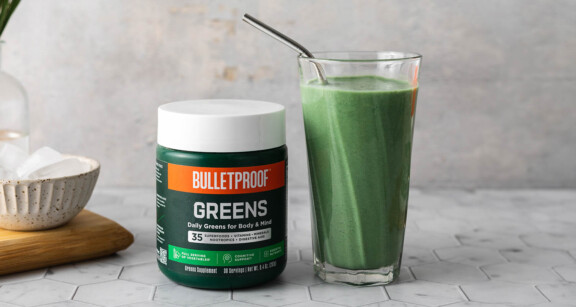Vitamin A
Do you know your vitamins? There are 13 vitamins with letters. This includes A and all the B vitamins: B1, B2, B3, B5, B6, B7, B9 and B12. It also includes vitamins C, D, E and K. Here we explore vitamin A and how it may support your healthy lifestyle.
What does vitamin A do? A lot. Vitamin A contributes to your eye health, strong bones and smooth skin. It supports immunity and has other functions. It is possible to get your daily dose of vitamin A from the foods you eat. That said, taking vitamin A supplements can help you make sure you’re getting enough, especially on the inevitable off day.
Read on to learn what vitamin A is and all about its science-backed benefits. We’ll discuss how you can get enough vitamin A and more.
What Is Vitamin A?
Vitamin A is a crucial nutrient essential for your body’s proper functioning. As a fat-soluble vitamin, it plays a pivotal role in various functions.1 These include vision, immune function and skin health. It’s especially known as a vitamin that supports healthy eyesight.
Vitamin A foods include liver, eggs, dairy products and colorful fruits and vegetables. Eating Vitamin A-rich foods is essential for meeting your daily nutritional needs. Supplements can help, too.
Vitamin A Benefits
Vitamin A plays an important role in supporting your well-being. Next, we'll explore four ways vitamin A contributes to a healthy lifestyle.
Eye Health
Vitamin A is crucial for vision. This is because it’s part of rhodopsin, a protein in the eye.2 It helps detect light, especially in low-light conditions. This prevents night blindness. Have you ever heard the term eye vitamins? It’s said that eating carrots, which are a good source of vitamin A, can help you see in the dark. That’s not exactly true, but here’s what is: Carrots are a source of beta carotene. The body can convert beta carotene into vitamin A, though the conversion rate varies by person.
Bone Health
Vitamin A supports strong bones by regulating bone cell activity and promoting bone growth.3 It helps maintain bone density and integrity. This is important for skeletal health. There is conflicting evidence, but the right amount of vitamin A may reduce the risk of some bone-related health conditions.4
Smooth Skin
Vitamin A helps you get smooth skin. It supports the production and maintenance of skin cells.5 It aids in the repair of damaged skin tissues and regulates sebum production. This prevents dryness and maintains hydration.6 Plus, vitamin A’s antioxidant properties protect your skin from oxidative stress.7 This helps you put your fresh face forward.
Supports Immunity
Vitamin A supports the integrity of skin and mucous membranes. These membranes act as barriers against infections.8 It helps regulate immune responses and supports your body’s ability to fight off pathogens. And finally, vitamin A is involved in the production and function of white blood cells. These are crucial for immune defense.9
Now, let’s turn to scientific studies that highlight surprising ways in which vitamin A contributes to optimal wellness.
The Science-Backed Benefits of Vitamin A
Learn more about the science-backed benefits of vitamin A. Research is ongoing, but here are some ways we know vitamin A can support your health:
A recent study looked at how a specialized oral nutritional supplement (ONS) high in vitamin A affected hard-to-heal wounds.10 Patients who consumed the ONS experienced a significant reduction in wound size. This was versus those who didn’t. The results suggest that vitamin A, with other nutrients, may improve healing of hard-to-treat wounds.
Another study showed promising results for using Vitamin A to treat dry eye syndrome.11 Results showed that Vitamin A palmitate gel significantly improved tear film stability. It also promoted the repair of the surface layer of the eye. These findings point to vitamin A palmitate as a potential beneficial treatment option for people with dry eyes.
And finally, using a retinol serum, which contains a form of Vitamin A, can make skin brighter and look younger.12 Researchers tested two concentrations of the retinol serum on volunteers over 12 weeks. The results showed that the serum reduced skin pigmentation. It also reduced wrinkles and unevenness and improved skin elasticity and moisture.
Vitamin A supports an impressive range of functions, which is why you want to make sure you’re getting enough.
The Bulletproof Approach to Vitamin A
We believe in a comprehensive approach to health. That includes both proper nutrition and strategic supplementation. We emphasize the importance of a nutrient-dense diet. We also know it’s not always easy to stay on track. That’s why we formulate our supplements to help you fill possible nutritional gaps.
We want to make it easy for you to take your vitamin A. Getting the nutrients you need is key to optimal health and performance.
Spotlight on Vitamin A
We offer a range of supplements designed to support your wellbeing, including those with vitamin A.
Our Vitamin A-D-K features a blend of essential fat-soluble vitamins. This supplement combines vitamin A, as retinyl palmitate, with vitamin D3 and vitamin K. It supports your immune system, bone health and heart. For best absorption, we recommend taking Vitamins A-D-K with a meal containing healthy fats, like grass-fed ghee. And the best time to take vitamins A-D-K is in the morning or midday, as taking vitamin D late in the day may interfere with sleep.13
Try Bulletproof Greens for an easy way to boost your daily nutrient intake, including vitamin A. This supplement is a blend of organic greens, vegetables and herbs. It supports detoxification, digestion and energy levels. Since vitamin A plays a crucial role in skin health, immune function and vision, it is one of the best vitamins for women’s wellness.
We’re committed to making high-quality supplements to help you thrive every day. And that’s why we take extra care to make sure our products are safe and effective.
Our Supplement Testing Standards
We have high testing standards to ensure the quality, safety and efficacy of our supplements. We focus on transparency and accountability throughout the manufacturing process. This starts with sourcing premium ingredients from trusted suppliers. Before we use any ingredient in our products, we test it to verify its purity and potency and the absence of contaminants. Our state-of-the-art facilities stick to quality manufacturing processes to maintain strict quality control standards. We also monitor all production to uphold our commitment to excellence.
Our supplements undergo comprehensive testing in independent third-party laboratories. This is to confirm their quality and potency. The tests cover microbiological analysis, heavy metal testing and verification of active ingredient concentrations. We ensure our products meet the highest standards of quality and safety. Our dedication to quality assurance means you can trust our supplements to provide a premium experience.
Recipes for Vitamin A
Learn More About Vitamin A
FAQs
Vitamin A deficiency can show up as trouble seeing in the dark and dry eyes leading to blindness.14 It weakens the immune system, making you more prone to infections like measles. Your skin may become dry and rough.15 Severe deficiency can stunt growth in children and cause reproductive problems in adults. Eating foods rich in vitamin A, provitamin A (such as beta carotene) or taking supplements helps prevent these problems.
Yes, under certain conditions. First, you must have access to diverse and nutrient-rich foods. This includes a good variety of fruits, vegetables and animal products rich in vitamin A or provitamin A. If you’re vegan, vegetarian or have dietary restrictions, you may have fewer choices. This is especially true if you are limiting foods of animal origin. If your diet lacks vitamin A, consider taking dietary supplements to meet your daily needs.
The recommended daily intake of vitamin A varies depends on your age, sex and life stage. For adults, the recommended dietary allowance (RDA) for vitamin A is around 900 micrograms (mcg) for men and 700 mcg for women.16 Pregnant women may need higher amounts, with an RDA of about 770 mcg. Lactating women may need up to 1,300 mcg per day.
An excellent source of vitamin A is grass-fed beef liver. This is one of the most concentrated sources of vitamin A and should be eaten in moderation. Other animal-based options include pasture-raised eggs, particularly the yolks. Wild-caught fish such as salmon and mackerel are good options, too. You’ll also find high amounts of vitamin A in quality dairy products like grass-fed butter and full-fat yogurt. If you’re plant-based, try leafy green vegetables like kale, spinach and collard greens. You can also enjoy colorful vegetables like carrots and sweet potatoes.
Yes, you can take too much vitamin A. This can lead to adverse health effects. Since vitamin A is a fat-soluble vitamin, excess amounts are stored in your body’s fat tissues. This excess can accumulate over time. Consuming too much vitamin A can result in toxicity. This is known as hypervitaminosis A. Symptoms of vitamin A toxicity can include nausea, vomiting, dizziness and headaches. In severe cases, it can cause liver damage and bone abnormalities.17 Stick to the recommended intake. Consult with a health professional before taking vitamin A supplements.
Yes, some medications may interfere with the absorption, metabolism or effectiveness of vitamin A. Others may increase the risk of vitamin A toxicity. For example, medications such as certain cholesterol-lowering drugs,18 weight-loss medications,19 and mineral oil20 may reduce the absorption of fat-soluble vitamins, including vitamin A, from the digestive tract. Plus, if you use retinoids to treat acne, you are at a higher risk for vitamin A toxicity.21 Consult your clinician before starting any new supplement, especially if you take medications.


